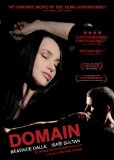| Reviews & Columns |
|
Reviews DVD TV on DVD Blu-ray 4K UHD International DVDs In Theaters Reviews by Studio Video Games Features Collector Series DVDs Easter Egg Database Interviews DVD Talk Radio Feature Articles Columns Anime Talk DVD Savant Horror DVDs The M.O.D. Squad Art House HD Talk Silent DVD
|
DVD Talk Forum |
|
|
| Resources |
|
DVD Price Search Customer Service #'s RCE Info Links |
|
Columns
|
|
|
Domain
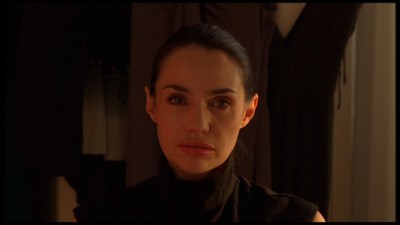
While watching the French filmmaker Patric Chiha's 2009 film Domain, which is just now being brought out on DVD in North America, it struck me that the relationship it depicts is of a type more common than its relative underrepresentation in fictional works might suggest: that of the curious, vaguely dissatisfied, naturally rebellious adolescent to an older relative who seems to live in a much cooler, freer world than any teenager is likely to find at home with mom and dad. It's a special kind of relationship that can act as a much-needed safety valve for the classically fraught nuclear-family pressure chamber, but as Chiha deftly and powerfully depicts here, it can also be a double-edged sword. If all idols have feet of clay, how much more devastating is it when a hero so near to home and venerated from such a close vantage point comes tumbling down?
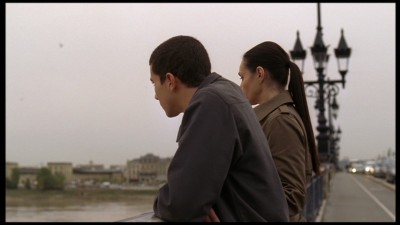
In this case, the admired, beloved elder is Aunt Nadia (Beatrice Dalle), a brilliant mathematics professor, divorcée, and less and less high-functioning alcoholic whose seemingly sophisticated, intellectual existence draws her favorite nephew, Pierre (Isaïe Sultan), a young man in his last year at the lycée (high school), into her decadent milieu of academics and bohemians. The film opens at an all-night bonfire party on a riverbank, where Nadia has invited her shy but impressed nephew to participate in all the philosophical, worldly, and sexually insouciant banter of her crowd, who eventually pass out on the grass and go home in the light of dawn - a time of day that seems magical after you've been out all night for the first time. Pierre and his aunt have a unique bond; his mother, Nadia's sister, is anxious about Pierre blowing off his age-appropriate lycée friends so often for his near-daily long walks in the park with his perpetually black-clad, shades-sporting aunt, whom she long ago distanced herself from, dismissing her as a fraud who drowned all her real potential in booze. But the film finds Pierre and his aunt at a crossroads, both in their respective lives and in their relationship; its drama arises from whether Pierre will be able to pull Nadia out of the whirlpool she seems determined to get sucked into (the murky, menacing waters of the Garonne - the river running through the city of Bordeaux, where the film takes place - are a recurring visual motif); whether he will get pulled down with her; or whether he will have to release her to her self-destruction in order to save his own life , which is just starting.
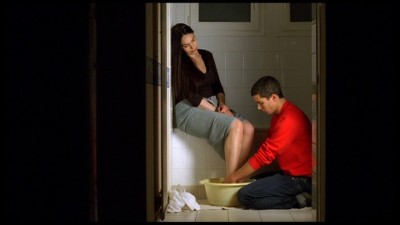
As touching as the kindred-spiritedness that clearly runs deep between Pierre and Nadia is, the film is at its best when it's observantly, empathetically gauging the complexities and dangers Chiha knows to be latent in all close, intense relationships. On the one hand, Nadia has allowed Pierre to develop independently from his loving, well-adjusted, but stiflingly bourgeois immediate family; on the other, that makes her the one holding the apron strings that have to be cut as Pierre emerges from his shell and into adulthood. When he begins to explore other relationships, flirting and eventually going home with a handsome, friendly man on the tram, what feels like a burgeoning romance (and one of the film's quietly well-done touches is its treatment of Pierre's homosexuality as a simple fact and virtual non-issue) is impinged upon by Nadia's increasing blackouts, injuries, erratic behavior, and depression, which she looks to Pierre to help her through, adding into the bargain a vaguely incestuous tension to their relationship that frightens him, tearing him between the desire to withdraw and join a life in the outside world that now holds new pleasures and discoveries for him, and the responsibility he feels toward a loved one who, we infer, has played no small part in lending him support and being there for him during his own travails of withdrawn, underconfident adolescence. Pierre cannot escape the disheartening, bleak fact that what began for him and Nadia as a frolicsome (in its way), mutually fulfilling Auntie Mame situation is fast becoming a treacherous Shadow of a Doubt, and whatever path he takes, Pierre will have to sacrifice something important.
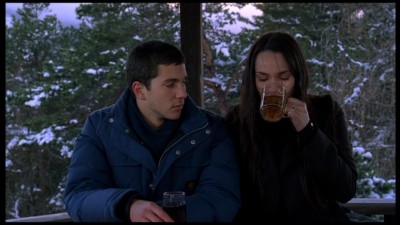
Dalle and Sultan are very well-cast as this troubled, moving duo; each works marvelously with the other to bring out the closeness and dawning sad ambivalence of the film's central relationship, all the while letting us see and fully understand what is happening in each one of them as individuals - the vacillations that may spell the end of what they've been for each other. Chiha and cinematographer Pascal Poucet (Come Undone), along with the melancholy minor-key soundtrack music by French gloom-folk chanteuse Milkymee, create a tenderly restrained mood, an atmospheric chamber in which the two principal characters have shut out the rest of the world and do a codependent dance of suffocating need and painful withdrawal. The film only errs when Chiha has things lapse too far into the merely moody; I'm sure that one much too long scene that takes place in a disco/cabaret was meant to be slightly surreal and abstract (and it is beautifully shot), representing in microcosm what Nadia's world represents for Pierre, but it comes off as jarringly arch and contrived, mere posturing that breaks the film's generally more restrained, reflective, naturalistic flow; it feels wrong, like cutting away from the quietude of one of Bergman's psychological grappling matches to a crowded, busy Fellini scene of carnivalesque nightlife. Much better are the scenes set at the wintry, isolated Austrian luxury rehab center where Nadia finally agrees to give sobriety a try, and where the two experience the breaking point of their emotional push and pull.
The film's qualities easily outweigh its flaws, though; scene after scene is rich in smart, involving character development, laying out a dramatic buffet from which Sultan and Dalle have gleaned the choicest tidbits for us. The film understands each of its characters mutually exclusive desires (one for self-annihilation, one to embrace a life that's beginning at last) and allows us, through the astutely-measured distance it attains through its style and the script's well-chosen glimpses into key moments, to share in that understanding. It's because the film lets Pierre and Nadia be who they are and want what they want without judgment that its seemingly inevitable ending is so heartbreaking, nearly tragic; the point is less about whose feelings or actions are right or wrong than that everybody hurts.
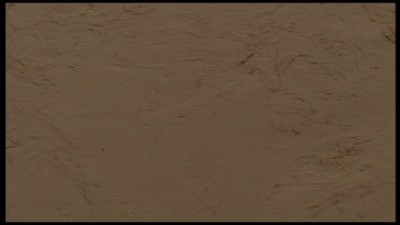
THE DVD:
The transfer, presented anamorphically at the film's theatrical aspect ratio of 1.85:1, is very good, with the many darker scenes retaining their nuance amid blacks that have kept their solidity, and with the colors vivid and variegated, the skin tones natural-looking. Very little edge enhancement and no aliasing were discerned.
Sound:The disc's Dolby Digital 2.0 stereo soundtrack (in French with nonoptional English subtitles) is excellent when it comes to the film's mostly naturalistic sound (dialogue, footsteps, street/nature sound, etc.) and especially shines in the occasional musical interludes, which offer Milkymee's soundtrack in top-notch, resonant, and fully dimensional audio quality.
Extras:Nothing except for the film's theatrical trailer and a handful of other trailers for films from Strand Releasing.
FINAL THOUGHTS:Despite its occasional lapse into chicly glum posturing, Patric Chiha's Domaine has a heart that beats at a strong, steady, subdued tempo thanks to the fine-tuned psychological insights in the director's script, as well as his ability to use the camera and the cutting room to create a space in which subtle, complex emotions to flourish. Perhaps above all, the film owes its justified claim to our attention and involvement to its beautiful casting, the skillful way Beatrice Dalle and Isaïe Sultan inhabit their characters and play out the peculiar relationship, the changing needs and power shifts, between cool, damaged aunt and introverted, impressionable nephew. At its best, the film attains some of the intimacy and emotional incisiveness with which Bergman made his name, allowing human pain, longing, and frustration to seep through its deceptively still surface as if of their own accord. Recommended.
|
| Popular Reviews |
| Sponsored Links |
|
|
| Sponsored Links |
|
|
| Release List | Reviews | Shop | Newsletter | Forum | DVD Giveaways | Blu-Ray | Advertise |
|
Copyright 2024 DVDTalk.com All Rights Reserved. Legal Info, Privacy Policy, Terms of Use,
Manage Preferences,
Your Privacy Choices | |||||||









